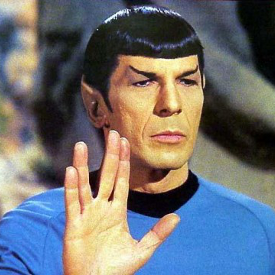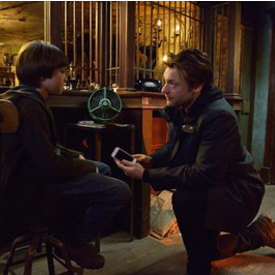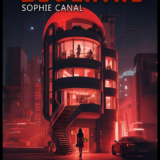The best thing about South Korean writer/director Bong Joon-Ho’s first English-language movie, Snowpiercer, is everything in it that’s not American. It’s in English, it’s full of American actors, it has all the trappings of a summer effects flick, yet the best parts are the ones you’d never find in an American movie, and they’re the ones that kept me entertained.
Snowpiercer’s failing is that it’s simultaneously overwritten and underwritten. It’s a blatant political allegory whose obvious points are muddled and vague. If you can imagine such a thing.
It’s set on a train that runs in a loop over much of the globe. Eighteen years earlier, an experiment to end climate change went terribly awry and froze solid the Earth (perhaps they seeded the clouds with Ice-9?). All life is dead but that on the train. We meet the people at the back of the train first. They live a grim, steam-punkish existence, the poor bastards. Everything is dirty and brown. There are no windows. They subsist on gelatinous rectangular protein bars. Armed troops keep them in their place.

Curtis (Chris Evans) isn’t going to take it any more. Seems he’s got a plot well underway, and it’s almost go-time. He’s encouraged by old-timer Gilliam (John Hurt), who remembers well past failed revolutions.
It’s not long before Curtis enacts the plan. The poor folk of the rear attack. Car by car, they move up the train, headed for the engine, and the man who began it all, Wilford (Ed Harris).
One choice I liked was not to show any of the rich people prior to our heroes seeing them. We begin on the back of the train, and only see the subsequent cars as our heroes reach them. In this way, every car is a surprise. Or new, anyway. What’s not a surprise is that as they move forward, the train becomes ever ritzier.
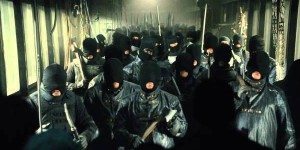
Early on they reach a car with windows, allowing Curtis and the others a view of the outside world, frozen over. Next they find out what goes into those protein bars: delicious bugs. Next is—drat!—a car full of stocking-masked men weilding axes and knives. The two groups face off. One masked man produces a large fish and slices open its belly. Two other men bloody their axes in the fish’s guts. This is one of those moments I mentioned. I’m going to assume this makes perfect sense to certain Asian audiences, something about bloodying one’s weapons before a fight. To my eyes, it’s mysteriously creepy. The ensuing fight, a long one, is likewise a far cry from anything in an American summer blockbuster in its excessive violence.
Perhaps the best scene comes when they enter the aquarium car. Wilford’s aide, Mason (Tilda Swinton, with crazy fake teeth and giant eyeglasses), held hostage by Curtis’s rebels, asks if they’d like sushi. And there in the car is a sushi counter manned by a chef. Who wouldn’t want to pause for a sushi snack mid-revolution?

Another scene I liked was the one in the school car, in which a chirpy teacher (Alison Pill) teaches the history of the great and wise Wilford to the little childrens. It’s a surreal break from the murder and mayhem, with a sense of humor that would never show up in a mainstream American movie.
Ultimately, the make-up of the train cars isn’t especially logical. But it makes allegorical sense, and that’s what the movie is interested in.
Too bad its obvious allegory is delivered in such a confused way. Characters die off suprisingly often, but without evident meaning, aside from the general: people will die in revolutions. Most of the characters feel unimportant to the story; they exist only to be killed. This is especially odd in the case of Gilliam, who dies almost off-screen. It’s later revealed that his importance to the train is far greater than we suspected. Strange that he would disappear with so little fanfare.
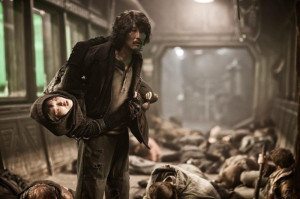
Song Kang-ho plays Namgoong, an expert in electronics, banished by Wilford into cold storage. Curtis needs him to open the doors to each new car. Kang-ho goes along with the plan, but he’s got other ideas brewing. He thinks the cold outside is survivable.
Which brings us to the ending. I’ll describe it in general, but this is still a bit spoilery. You have been warned.
After passing through lavish dining cars, a rave, and a drug den, among others, Curtis, Namgoong, and Namgoong’s adult daughter, Yona (Go Ah-sung), the only survivors of the revolution, reach the massive door to Wilford’s engine-car. Namgoong reveals his plan: he’s not going to blow open Wilford’s door; he’s going to blow open the door to the outside world.
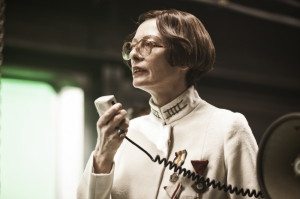
Some business ensues, and Curtis finds himself in the engine room chatting with the elusive Wilford. Wilford gives a speech about how the train is a perfectly balanced ecosystem, with everyone in their place, doing their job, fulfilling their purpose. It’s not a well written speech. Wilford says what you know he has to say in this allegory, but he says it so terribly you wonder if maybe he didn’t say it after all. Curtis, naturally, having come so far, is the man meant to take over for Wilford, who it must be admitted leads a none-to-perfect life alone at the front of the train. Curtis is to be the new leader, the one who perpetuates the system. Which system is stratified as it must be to ensure the survival of everyone.
Looks like Curtis is going to go for it, when a last horror is revealed.
At which point Namgoong blows open the train. The train does not, let’s say, survive the blast.

The ending is about the last thing you’d ever see in an American action movie. The political meaning is clear: you cannot change the system by working within it. It must be destroyed, no matter the cost in lives. Something new must—and can—be built in its place.
I like a movie that makes a statement. I only wish it made it with any kind of graceful clarity.
Everything about Snowpiercer feels muddled and uncertain, while at the same time being knock-you-in-the-head-with-a-two-by-four obvious. It’s a lumpy, unweildy movie, where you want it to be sleek and well-oiled. And yet I still found much of it entertaining. It’s just off-kilter enough to feel different in a world where explodey action movies are ever more safe, predictable, boring, and meaningless.
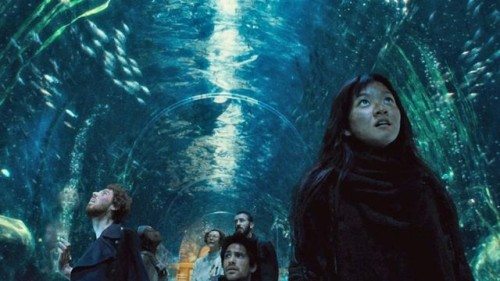
This article originally appeared on the cinema blog Stand By For Mind Control, where editors Sean McPharlin (aka the Supreme Being) and Zack Kushner (aka the Evil Genius) cover the breadth of cinema in their inimitable style. They are thrilled to be contributing discussions of genre cinema to Amazing Stories.


